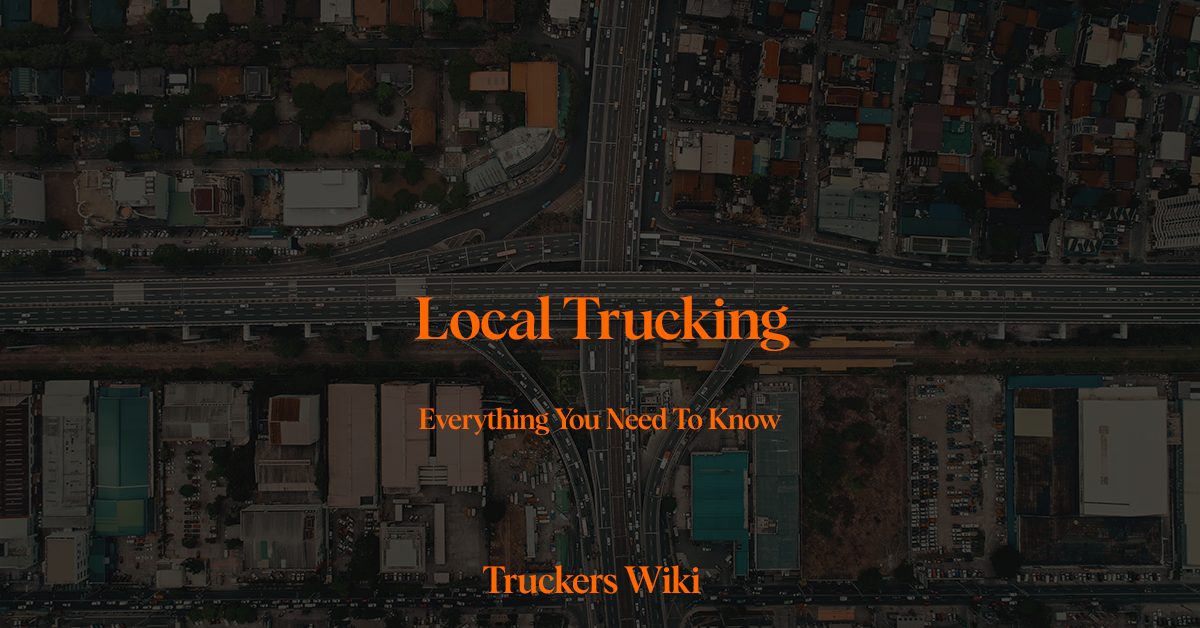
Table of Contents
What is Local Trucking?
Local trucking refers to the transportation of goods within local areas such as a city, county or state.
Drivers usually complete their route within a single day, allowing them to be home every night.
Unlike over-the-road (OTR) or long-haul or regional trucking, which involves interstate or cross-country travel.
Local runs usually transport goods from distribution centers or warehouses to retail locations, manufacturing plants, or directly to consumers in the case of last-mile delivery.
Local covers services as well, such as construction or cement trucks, oilfield tanker runs and other heavy-duty jobs.
Role in the Supply Chain
Whether it’s delivering goods to stores, transporting raw materials to manufacturing plants, or bringing packages to customers’ doorsteps, local trucking plays a significant part of the trucking industry.
Local truckers often transport goods from larger regional distribution centers to smaller local warehouses or directly to retail locations. They also handle pickups and deliveries for businesses and consumers within a local area.
Benefits of Local Trucking for Drivers
For truck drivers, local trucking offers several benefits over long-haul routes:
Home Time: One of the biggest draws of local trucking jobs is the regular home time. Unlike long-haul drivers who can spend weeks on the road, local drivers are usually home every night. This regular schedule can be beneficial for drivers with families or those who value a consistent work-life balance.
Familiar Routes: Local drivers typically operate within a specific area, which means they become very familiar with their routes. This can make the job less stressful compared to long-haul trucking, where routes can change frequently.
Less Wear and Tear: Because local trucking involves shorter distances, there’s usually less wear and tear on the vehicles, potentially reducing maintenance issues.
Variety of Work: Local trucking can offer a diverse range of work, from delivering packages for e-commerce companies to hauling construction materials for local building projects.
Common Requirements for Local Trucking Jobs
Commercial Driver’s License (CDL): A CDL is required for any driver operating a vehicle with a Gross Vehicle Weight Rating (GVWR) of 26,001 pounds or more, carrying hazardous materials, or transporting more than 16 passengers. The class of CDL (A, B, or C) will depend on the size and type of the vehicle being driven. So, yes, many local truck drivers will need a CDL.
Endorsements: Depending on the specific type of vehicle and cargo, drivers may need certain endorsements on their CDL. For example, if they’re driving a tanker truck or transporting hazardous materials.
Learn more about CDL endorsements here.Experience or Training: While not always required, many employers prefer drivers with prior experience or professional training. Some companies may offer training programs for new drivers.
Physical Health: All commercial drivers, including local truck drivers, must pass a Department of Transportation (DOT) physical exam to ensure they’re physically fit to drive.
Clean Driving Record: Most employers require a clean driving record with no serious violations.
Age Requirement: To drive a commercial vehicle, you generally must be at least 21 years old. However, some states permit 18- to 20-year-olds to drive commercial vehicles within the state (intrastate driving).
Challenges in Local Trucking
While local trucking offers several benefits, it also comes with its own set of challenges. These can include:
Time Pressure: Local trucking often involves multiple pickups and deliveries each day, which can lead to a high-pressure work environment.
Traffic and Congestion: Local drivers often have to navigate through heavy city traffic and congested urban areas, which can be stressful and time-consuming.
Physical Demand: Some local trucking jobs, particularly those involving last-mile deliveries, may require more physical labor for loading and unloading goods.
Non-CDL is popular niche in local trucking.
The Bottom Line
Local trucking plays an indispensable role in the day-to-day freight transportation landscape, ensuring that goods get where they need to go promptly and efficiently.
For many drivers, the benefits of regular home time (every night), familiar routes, and varied work make local trucking an appealing career option.
I’m Anthony TV has a POV video talking about benefits of local trucking.

